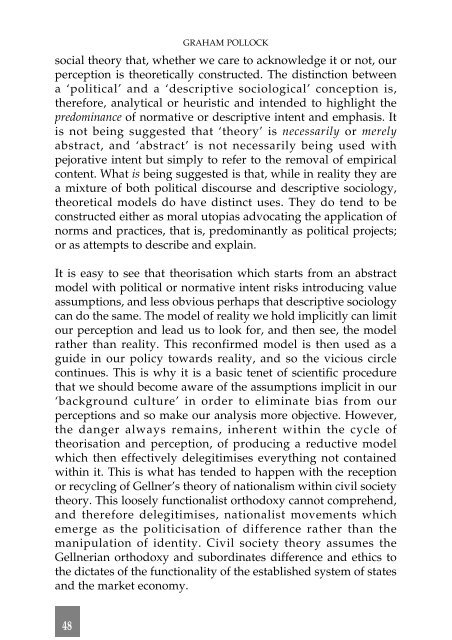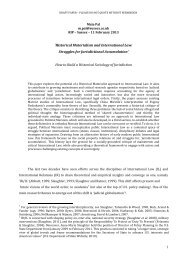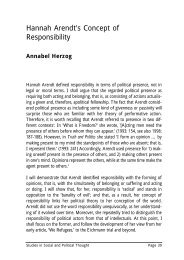Civil Society Theory and Euro-Nationalism - University of Sussex
Civil Society Theory and Euro-Nationalism - University of Sussex
Civil Society Theory and Euro-Nationalism - University of Sussex
Create successful ePaper yourself
Turn your PDF publications into a flip-book with our unique Google optimized e-Paper software.
48<br />
GRAHAM POLLOCK<br />
social theory that, whether we care to acknowledge it or not, our<br />
perception is theoretically constructed. The distinction between<br />
a ‘political’ <strong>and</strong> a ‘descriptive sociological’ conception is,<br />
therefore, analytical or heuristic <strong>and</strong> intended to highlight the<br />
predominance <strong>of</strong> normative or descriptive intent <strong>and</strong> emphasis. It<br />
is not being suggested that ‘theory’ is necessarily or merely<br />
abstract, <strong>and</strong> ‘abstract’ is not necessarily being used with<br />
pejorative intent but simply to refer to the removal <strong>of</strong> empirical<br />
content. What is being suggested is that, while in reality they are<br />
a mixture <strong>of</strong> both political discourse <strong>and</strong> descriptive sociology,<br />
theoretical models do have distinct uses. They do tend to be<br />
constructed either as moral utopias advocating the application <strong>of</strong><br />
norms <strong>and</strong> practices, that is, predominantly as political projects;<br />
or as attempts to describe <strong>and</strong> explain.<br />
It is easy to see that theorisation which starts from an abstract<br />
model with political or normative intent risks introducing value<br />
assumptions, <strong>and</strong> less obvious perhaps that descriptive sociology<br />
can do the same. The model <strong>of</strong> reality we hold implicitly can limit<br />
our perception <strong>and</strong> lead us to look for, <strong>and</strong> then see, the model<br />
rather than reality. This reconfirmed model is then used as a<br />
guide in our policy towards reality, <strong>and</strong> so the vicious circle<br />
continues. This is why it is a basic tenet <strong>of</strong> scientific procedure<br />
that we should become aware <strong>of</strong> the assumptions implicit in our<br />
‘background culture’ in order to eliminate bias from our<br />
perceptions <strong>and</strong> so make our analysis more objective. However,<br />
the danger always remains, inherent within the cycle <strong>of</strong><br />
theorisation <strong>and</strong> perception, <strong>of</strong> producing a reductive model<br />
which then effectively delegitimises everything not contained<br />
within it. This is what has tended to happen with the reception<br />
or recycling <strong>of</strong> Gellner’s theory <strong>of</strong> nationalism within civil society<br />
theory. This loosely functionalist orthodoxy cannot comprehend,<br />
<strong>and</strong> therefore delegitimises, nationalist movements which<br />
emerge as the politicisation <strong>of</strong> difference rather than the<br />
manipulation <strong>of</strong> identity. <strong>Civil</strong> society theory assumes the<br />
Gellnerian orthodoxy <strong>and</strong> subordinates difference <strong>and</strong> ethics to<br />
the dictates <strong>of</strong> the functionality <strong>of</strong> the established system <strong>of</strong> states<br />
<strong>and</strong> the market economy.
















